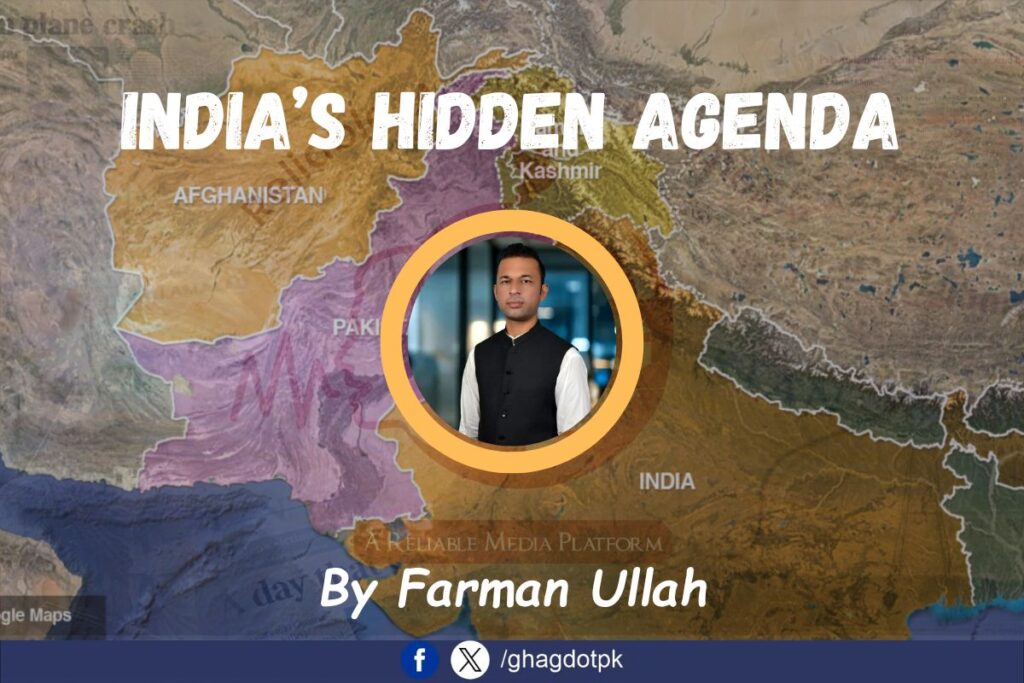By Farman Ullah
India, often lauded for its economic growth and democratic framework, has consistently projected itself as a peace-loving nation. However, beneath this façade lies a carefully crafted agenda that poses significant challenges to regional stability, particularly in South Asia. From its expansionist policies to its covert operations in neighboring countries, India’s hidden agenda warrants critical scrutiny.
Ties with Afghanistan
Soon after the fall of Kabul in August 2021, New Delhi abandoned its diplomatic and development activities in Afghanistan due to security concerns. However, India continued to engage the Afghan interim government on two fronts.
India used humanitarian assistance as a tool to open communication channels with the Afghan regime.It engaged with Afghan officials in the UAE for diplomatic outreach.
New Delhi gradually but carefully started its engagement with the Afghan Taliban in November 2023. These meetings witnessed significant progress in terms of bilateral engagement, with Indian officials agreeing to increase humanitarian assistance.
According to the United Nations World Food Programme, India has sent more than 47,000MT wheat. Moreover, Delhi has supplied 200 tons of medical aid.
The Quest for Regional Dominance
India’s strategic ambitions revolve around establishing hegemony in South Asia. Its foreign policy and military posturing reflect an intent to marginalize its neighbors, including Pakistan, Nepal, Bhutan, and Sri Lanka. The disproportionate allocation of its defense budget, which stood at approximately $83 billion in 2024, underscores its aggressive approach. This military buildup is not merely defensive but aims to project power across borders, keeping smaller nations in a constant state of unease.
The Role of RAW in Destabilization
The Research and Analysis Wing (RAW), India’s premier intelligence agency, has often been accused of fomenting unrest in neighboring countries. Pakistan, in particular, has borne the brunt of RAW’s clandestine operations. From supporting separatist movements in Balochistan to funding terrorist outfits, RAW’s activities have consistently aimed to undermine Pakistan’s stability. The confessions of Indian spy Kulbhushan Jadhav, arrested in 2016, highlighted India’s covert interference in Pakistan’s internal affairs, exposing its ulterior motives.
The Kashmir Conundrum
India’s illegal occupation of Jammu and Kashmir remains a glaring example of its expansionist agenda. Since the revocation of Article 370 in August 2019, the region has been subjected to a brutal military siege, widespread human rights abuses, and demographic engineering. The international community has largely turned a blind eye to the plight of Kashmiris, allowing India to continue its oppressive policies unchecked.
Anti-Pakistan Propaganda
India has also launched an extensive propaganda campaign to tarnish Pakistan’s image on global platforms. By leveraging its diplomatic channels and media influence, India portrays Pakistan as a hub of terrorism while conveniently ignoring its own involvement in sponsoring state terrorism. Recent revelations by the EU DisinfoLab, which exposed a vast network of fake media outlets and NGOs working to discredit Pakistan, further underline India’s hidden agenda.
Marginalizing Minorities
Domestically, India’s agenda is marked by the marginalization of its minority communities, particularly Muslims. The rise of Hindutva ideology under the Bharatiya Janata Party (BJP) has led to a surge in hate crimes, discriminatory policies, and the erosion of secular values. The Citizenship Amendment Act (CAA) and the National Register of Citizens (NRC) are tools to disenfranchise millions of Muslims, reinforcing India’s exclusionary vision.
Economic Coercion and Water Politics
India’s control over shared river systems with Pakistan, as per the Indus Waters Treaty, has been weaponized to exert economic pressure. By threatening to divert or restrict water flows, India seeks to destabilize Pakistan’s agrarian economy, thereby amplifying its vulnerabilities.
The Silence of the Global Community
Despite ample evidence of India’s hidden agenda, the global community remains largely silent. This complacency is driven by India’s economic clout and strategic partnerships with powerful nations. However, ignoring India’s destabilizing actions risks long-term consequences for regional and global peace.
India’s hidden agenda is not merely a threat to its neighbors but a challenge to the ideals of peace and coexistence. It is imperative for Pakistan and other affected nations to expose these actions on international platforms while strengthening their internal resilience. A unified stance against India’s hegemonic ambitions can ensure a more balanced and peaceful South Asia.






